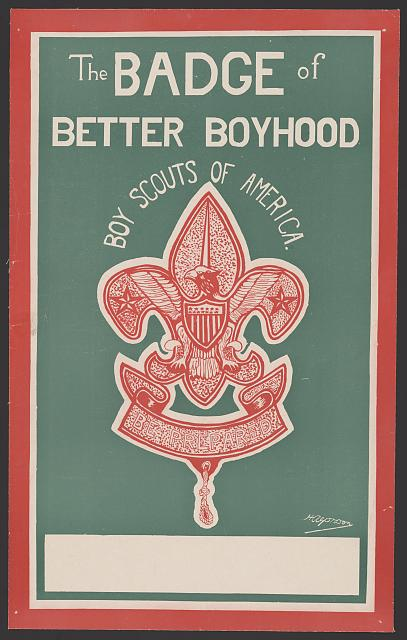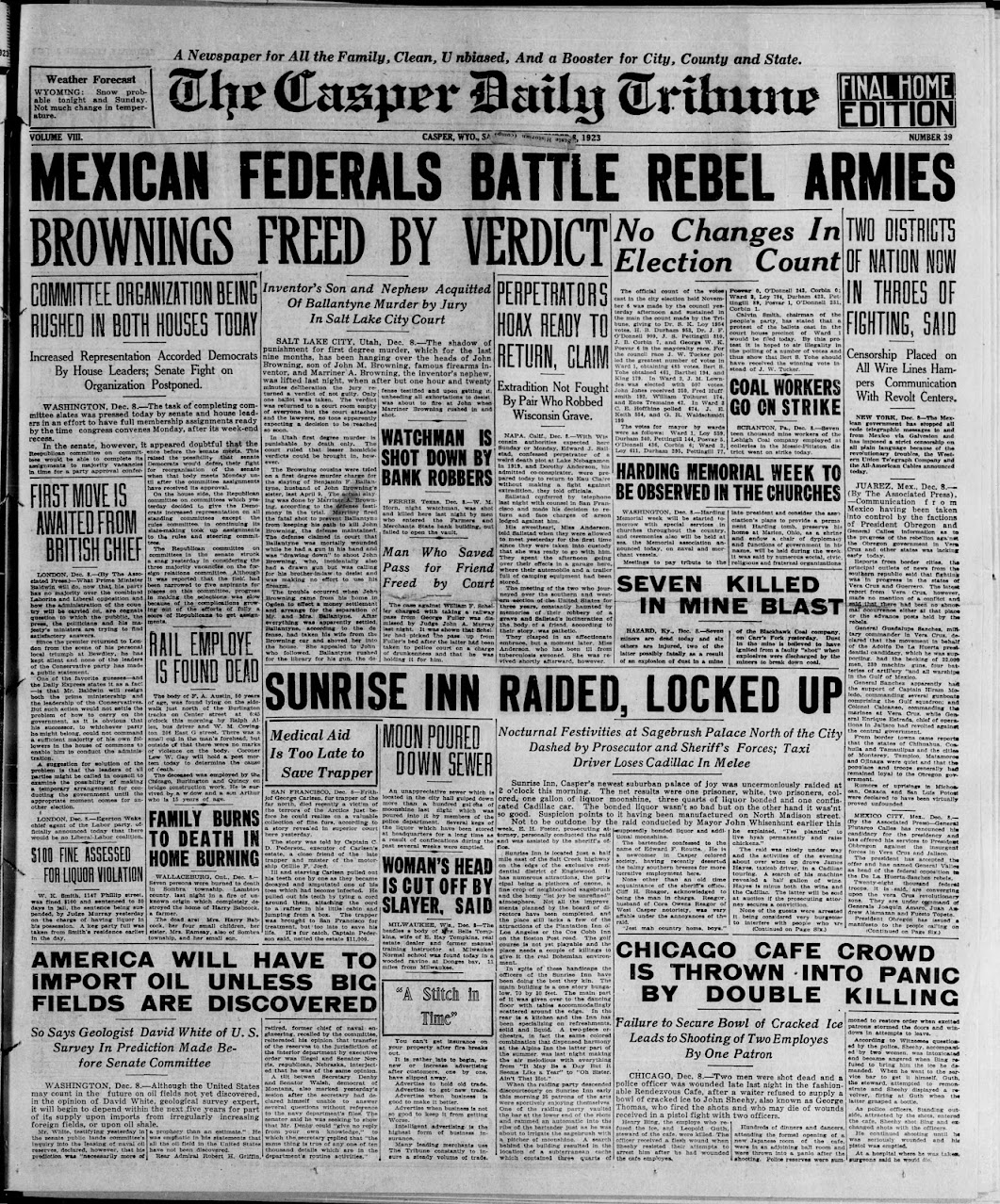The Boy Scouts of America is changing its name to Scouting America
Boy Scouts of America has announced it will rebrand as Scouting America, which, if media impressions are any measure, is a very big deal. Within days of the announcement, the collective online impressions of the news surpassed 14 million, according to the organization — a staggering figure that underscores the institution’s widespread influence.
Article in the Tribune.
Does it really suggest the "institution's widespread influence", or its tragic decline from what had been that influence?
I teed this up quite a while back and since that time the Southern Rockies Nature Blog, which is linked in here, has a really nice and personal blog entries on this item, entitled Bye Bye Boy Scouts. I can't really say goodbye to the Scouts that way, as I never was much of a Scout.
Usually I say I was never a Boy Scout, but that's not true. I was briefly. Probably around when I was in 6th Grade, or at whatever point it is when a person goes from Cub Scout to Boy Scout, when there were Boy Scouts. I didn't really last long in it, and it's hard to say exactly why. Part of it was, I think, as they group I was in, while they did do things, was slow to get around to doing them. The several merit badges I earned while I was in, I just picked out and did by myself. That "by myself" thing probably had a lot to do with it also, as by this time my lifelong introvert nature was firmly set in, and unless compelled by external forces or acclimated by long exposure to a group, you'll feel uncomfortable in a group. Usually I say that I'm "not much of a joiner", with this being, I think, part of it.
Another part may simply be that I'm highly rural and was then.
We don't tend to think of it this way, but Scouting was an urban movement.1 Aware of the inadequacy of young British men in the Boer War, Lord Baden-Powell, who after the war became the British Army's Chief of Cavalry, founded the Boy Scouts. The idea was twofold, those being 1) British boys had become a bunch of anemic unskilled wimps who needed some manning up from nature, and 2) British boys had become a bunch of anemic unskilled reprobates who needed some Muscular Christianity.
The original organization had no place for girls. Girls wanted to participate in things, and soon had their own organizations. The two didn't mix.
And frankly it didn't mix for good reason There are such things as manly, and womanly virtues. Much of what the original Boy Scouts sought to address was spot on in its observations, and Scouting did a really good job of addressing them. Often affiliated with churches, Scouting groups were successful in teaching boys a lot of valuable outdoor skills that often stuck with them for life, and they were benefitted in that goal by the absence of girls, who at a bare minimum are extremely distracting to boys and young men. Given their natures, young women are usually, although not always, much less distracted by young men.
There's been a lot written on the decline of the Boy Scouts, and there are various theories about it. One of the blogs linked in here, The Southern Rockies Nature Blog, has an article about it that's worth checking out. Whatever it was that brought it to its current state, it was still a pretty strong organization in the 1970s, when I had my brief association with it. At that time, even in the rural West, a lot of boys were part of it, and for that matter quite a few of their fathers had a strong association with it. Being in the Boy Scouts (which my father never was), was part of a multi generational thing.
Signs of decline were there even then. Of my good friends, only one was a Boy Scout, which his father had been. Another had a father who had a strong history of Scouting, but my friend wasn't in it. I was in a youth organization in my early teens, but it was the Civil Air Patrol, which with its martial aviation theme was a completely different type of organization. Rural kids, of whom I knew a lot, tended to be in the FFA, which had direct practical application to them.

I wish I could pinpoint what was going on, but I really can't. I've tried to do so here before, and probably haven't been successful. Looking at the topics addressed in this thread, however, I think part of it may have been that in the post World War Two era that went into the 1970s, the retained gaze upon the rural really faded. Even television reflected that as programming went from the rural focused on the 1960s, such as The Andy Griffith Show, The Beverley Hillbillies, and Green Acres, the last two of which anticipated the change, to urban centric dramas such as Newhart, The Mary Tyler Moore Show, WKRP In Cincinnati, etc. Americans had been moving into the cities for a long time, but suddenly they quit looking outside of them. Even a gritty urban environment depicted in something like The French Connection was celebrated in a way. It's notable that a figure like Clint Eastwood, who had come up in westerns, started appearing as Dirty Harry in urban California at the same time, and Dirty Harry, like Popeye Doyle, wasn't portrayed as any sort of Boy Scout.
The atmosphere of the late 60s also brought in destructive forces that we're still dealing with. The resolute male admired and celebrated from the era of The Strenuous Life on to the Ballad of the Green Berets suddenly, in the Strauss Howe fashion, yielded to the feminized and marginalized male, at least in the dominant WASP culture. It's never really recovered, and we can see some of the reactions to that playing out in society now.
In that atmosphere, Scouting attempted to adapt, but that's part of the problem. The campaign hat went out, and the red beret came in.2 Out with the old, and in with the new. The institution already had, however, its close association with Christianity and a sort of "goody two shoes" reputation. It probably should have just doubled down on that and its rural focus, but it tried to adapt instead.
Like other institutions that were heavily male and which had become somewhat soft, it also began to be plagued, apparenlty, with male on male sexual conduct.
People hate to discuss this part, so the realities of this should be noted. One of the byproducts of keeping boys and girls separate in Scouting is that it not only allowed boys to focus, but it kept boys and girls out of close proximity to each other. Scouting involves teenagers. No matter how focused or watched, when male and female teenagers are together, some of them will misbehave in ways that create life changing byproducts. A person only has to look at the expansion of the role of women in the military in order to appreciate this.3
We already know that the largest group of abusers of teenagers in this fashion are teachers. The decline in personal morality brought about by the Sexual Revolution helped unleash this, and I'd wager that a person could easily find a story of a teacher engaging in this conduct with a teenaged charge nearly every month. I ran across one just last week, in which the assailant was a female teacher and the victim something like a mere 13 years old. If this happens in an institution in which being discovered will result in the end of a career and jail time, and in which getting caught is highly likely, it's going to happen in situations in which this is much less discoverable.
Put bluntly, as the Muscular Christianity focus waned, the Sexual Revolution came on, and an overall feminization of society advanced, predatory homosexuality in the Boy Scouts became inevitable to some degree, and it had probably always been there at least to some extent. It's customary at this point to note that not all homosexuals are predatory, and that only a minority are, which is absolutely true, but it happened. That some people would let their behavior go in an all male setting shouldn't be any more surprising than those instances of male coaches preying on young teenage female athletes. It's reprehensible, but without additional external controls, it was going to occur.
This helped cause Scouting's popularity to drop off massively, and not surprisingly. Parents quit encouraging their children to be Scouts. Not really knowing what to do about it in the context of the culture, Scouting opened its doors to girls. This predictably hasn't helped, and it won't. Scouting will, I'd guess, be largely taken over by girls, but it won't be an organization that Boy Scouts prior to the 1970s would recognize.
There's something to all male bonds between conventionally oriented males that is unalterably different from ones with women. Probably our biology has a lot to do with it. The mateship that exists in military units, for example, which are all male, is completely different from an organization that has even one female in it.
The larger tragedy is that the very thing that Scouting was created to address in the first place, in large measure, is probably need as much now as it was then. The source of the problem is large the same, the urbanization of the country and the corrupting influence of urban life, combined with the absence of male roles, something that existed in the very early 20th Century and something that exists now, albeit for different reasons. Scouting, by having gone first soft, and then semi feminized, is no longer the organization that it was, that addressed that.
Footnotes:
1. Recently I read Doug Crowe's book A Growing Season, which is extremely off color, but extremely interesting. The back of the book, where the short review is, terms it a novel, but it isn't. The figures in it are all real, I either know of them or actually knew some of them.
It occured to me in posting this that part of the reason that the Boy Scouts lost its appeal to me here is that in a highly rural setting the first purpose of scouting, to introduce the outdoors, will be taken up by those who have a strong affinity towards it, which most young men do, all on their own. Going to Scouting events actually retards a person's ability to go outdoors and do what you want, with your young male associates, once somebody is of driving age, or at least it did then. As soon as somebody was 16, we were pretty much loose in the world.
As noted, not surprisingly, our companions in these forays were all male. I can't recall going on an outdoor adventure of any kind with a female of my own age until I was at the University of Wyoming. Nature segregates us in that fashion, even if society doesn't want us to. As A Growing Season demonstrates, that certainly gives rise to opportunities to engage in vice, although did not in any serious fashion, and the few of my fellows who really fell into it did so, notably, in town.
2. Only if troops adopted it, however.
3. Without putting too fine a point on it, two women I know of who were justifiably very proud of their military service, and neither of which might be regarded as libertine, had early discharges from the service for this very reason, followed by the birth of their oldest child not long after. The service with the biggest problem, seemingly, is the Navy, where close proxmity on ships has caused an alaraming pregnancy rate in some instances.
Related threads:











































 Boy Troop
Boy Troop
 Girl Troop
Girl Troop